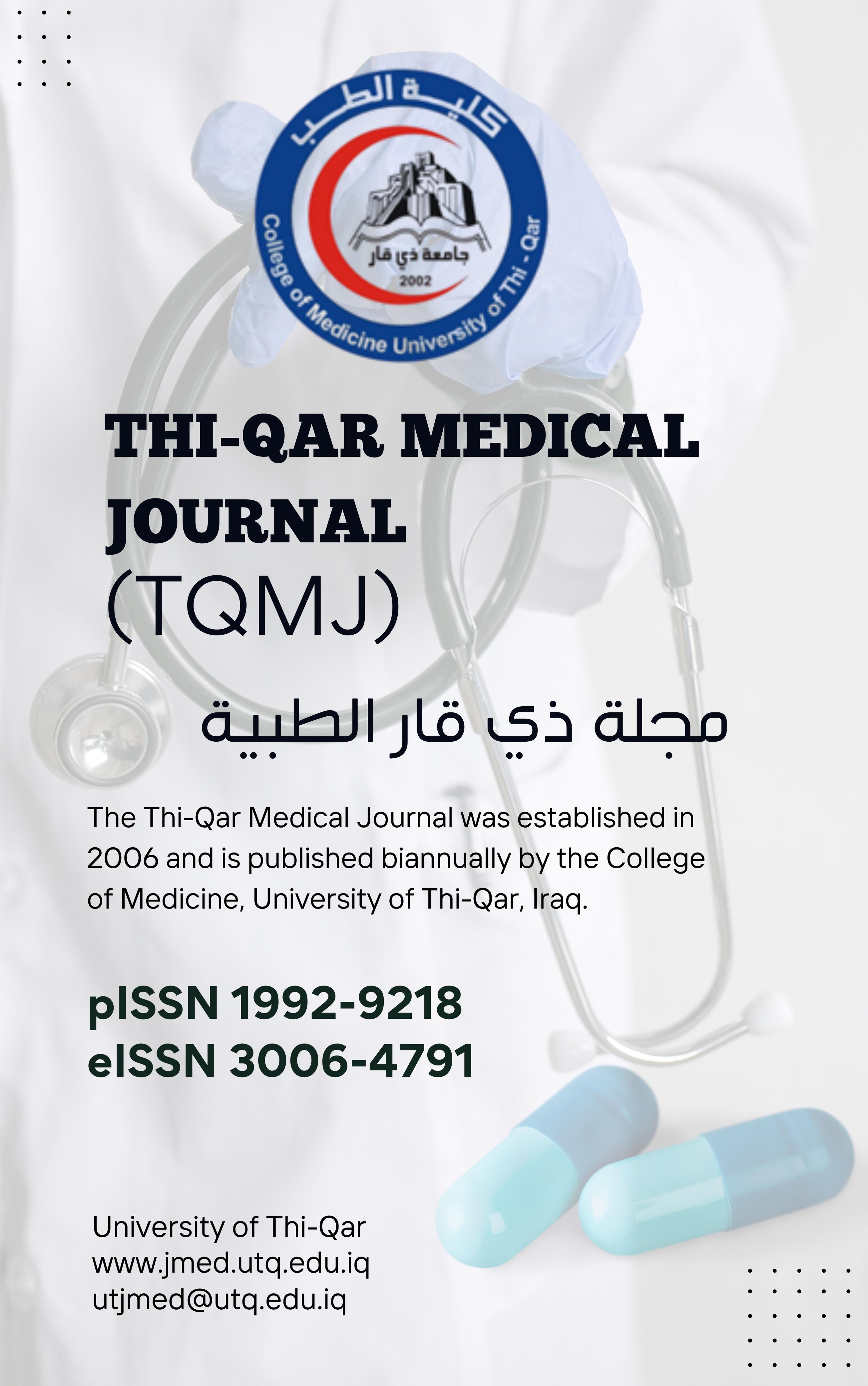CORONARY ANGIOGRAPHIC FINDINGS IN PATIENTS WITH METABOLIC SYNDROME
DOI:
https://doi.org/10.32792/tmj.v7i1.194Abstract
Background and objectives:metabolic syndrome is a common disorder associated with increased risk of cardiovascular diseases and diabetes , its prevalence in Iraq is not well estimated , many studies relate the relation of this syndrome to coronary artery disease due to the clustering of the cardiovascular risk factors in this syndrome , for this reason we tried in our study to evaluate the relationship between this syndrome and ischemic heart disease documented by coronay angiography , furthermore we planned in our study to classify and determine the severity of different coronary lesion in this syndrome. Patients and methods: in this study we enrolled 146 patients with lschemic heart disease, 76 of them having the criteria of metabolic syndrome and 70 patients with IHD and no metabolic syndrome were taken as controls between February 2010 to February 2011- angiography was done for all the patients, and the different types of coronary lesions and their complexity scores analyzed and reported according to the American heart association criteria and syntax scoring system. Results &Conclusion: The mean syntax score was significantly higher among patients with this syndrome and also, complex coronay lesions in from of, ostial, bifucational and multi vessels disease were significantly higher in this group wether they are diabetics or not in comparison to the control group.References
Ford ES, Giles WH, Dietz WH(2002). Prevalence of metabolic syndrome among US adults: findings from the third National Health and Nutrition Examination Survey. JAMA 287(3):356-359 PMID 11790215 .
Oscar C.Marroquin, Kevin E.Kip;David E.Kelley;Delia Johnson;Leslee J.shaw, et al, for the women's ischemic syndrome evaluation and investigators, circulation 2004;109:714-721 C2004 American Heart Association Inc) .
Executive summery of the third report of the national Cholesterol Education Program(NCEP) Expert Panel on Detection, Evaluation, and Treatment of High Blood Cholesterol in Adults(Adult Treatment Panel III) JAMA.2001;285:2486-2497.
,5.Expert panel on Detection, Evaluation, and Treatment of high blood Cholesterol in Adults. Executive summery of The Third Report of The National Cholesterol Education Program, and Treatment of high blood cholesterol in adults(adult treatment panel III).JAMA 2001;285:2486-6.American Heart Association's description of syndrome X , Grundy SM, Brewer HB, Cleeman JI, Smith SC, Lenfant D, for the conference participants. Definition of metabolic syndrome: report of the national, Heart, Lung, and blood Institute/American Heart Association conference on scientific issue related to definition. Circulation. 2004;109:433-438.
Reaven GM. Banting lecture 1988. role of insulin resistance in human disease. Diabetes 1988;37:1595-605. PMID 3056758.
Pollex, R.L.; Hegele, R.A. (2006). "Genetic determinants of the metabolic syndrome". Nat Clin Pract Cardiovasc Med 3 (9): 482-9. dio: 10.1038/ncpcaradio0638. PMID16932765.
Poulsen, P.; Vaag, A.; Kyvik, K.; Beck-nielsen, H. (2001). "Genetic versus environmental aetiology of the metabolic syndrome among male and female twins".
Groop, Leif(2000). "Genetics of the metabolic syndrome". British Journal of Nutrition 83
Fukuchi S, Hamaguchi K ,Sieke M , Himeno k, Sakata T, Yoshimtsu H (1 Jun 2004) . (role of fatty acid composition the development of metabolic disorders in sucrose induced obese rats)
Ali A.Rizvi, Metabolic Markers of Insulin Resistance in Overweight Persons, Annals Internal Medicine, Aug 2004; 141; pp: 241- 243.
Grundy SM,Brewer HB,CleemanJI,SmithSC,Lenfant D,for the Conference participants.Definition of metabolic syndrome, Circulation. 2004; 109:433-438.
Moon YS, Kim DH, Song DK; Serum tumor necrosis factor-alpha levels and components of the metabolic syndrome in obese adolescents. Metabolism 2004 Jul; 53(7):863-7. [Abstract]
Sherman SI, Gagel RF:Disorderers affecting multiple endocrine systems , In Fuci AS,Braunwald E, Isselbacher KJ.et al (EDS).Harrison principles of internal Medicine (14th ed.).New York, McGraw-Hill, 1998:pp.2131-2138.
Kumar P., Clark M., Obesity, clinical medicine, 6th ed. Edinburgh, Churchill Livingstone, 2005; pp.252-257.
Kylin E. [Studies of the hypertension-hyperglycemia-hyperuricemia syndrome]. Zentralbl Inn Med 1923; 44: 105-27.




